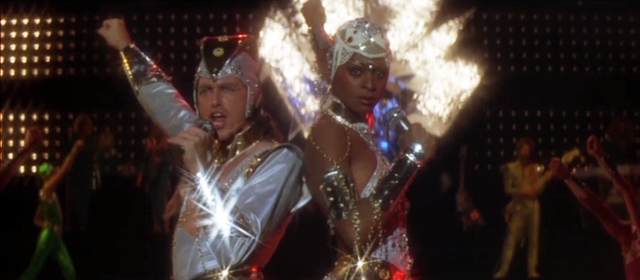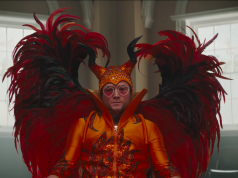
Menahem Golan and Yoram Globus are a pair of Israeli cousins who have turned up frequently in Eric’s Bad Movies, thanks to their uncanny ability to make awful films very cheaply and very quickly. They’ve produced more than 200 of them, including “Breakin’ 2: Electric Boogaloo,” “American Ninja,” “The Delta Force,” “Cobra,” “Firewalker,” “Allan Quatermain and the Lost City of Gold,” “Over the Top,” “Superman IV: The Quest for Peace,” “Masters of the Universe,” “The Forbidden Dance (… is Lambada),” the Lou Ferrigno “Hercules,” and “Death Wish V: The Face of Death.” In general, a Golan-Globus production is like a high school theater production. It doesn’t matter whether it’s any good, as long as it doesn’t go over budget and is finished by 10:30 so the janitors can come in.
The lone exception I’ve found so far is “The Apple,” an incomprehensible mind-trip that belongs to the genre of Biblical Allegories That Are Also Futuristic Disco Musicals. (See also: “Xanadu”; “Saving Private Ryan.”) Here, in one of their first American films, Golan and Globus seemed to be genuinely interested in producing something of quality. It almost doesn’t matter that they failed miserably in the attempt. The fact that they were even trying is remarkable. I mean, Roger Corman never tried, and he has an Oscar.
“The Apple” is set in The Future, specifically 1994. Like The Future in all chintzy, unimaginative movies, this future looks a lot like The Present (i.e., 1980), only with more matching jumpsuits. Although now that I think about it, there were a lot of matching jumpsuits in 1980, too. So our only real indication that it’s 1994 is that it is mentioned several hundred times in the lyrics and dialogue. “Here we are in 1994,” someone might say, nonchalantly. “My oh my, is it 1994 already? Land sakes, 1994!”
It’s the annual Worldvision Song Festival (which one? Why, the 1994 edition, of course!), an “American Idol”-ish band competition currently being dominated by a glittery duo called Dandi and Pandi. They sing a song about “BIM,” and the crowd loves it, even though what the hell is BIM? It turns out BIM is an acronym for Boogalow International Music, the talent agency that handles Dandi and Pandi. Like all major pop artists, these two are singing a song about the record label they work for. You will previous recall hits like Elvis Presley’s “RCA Victor Ain’t Nothin’ but a Hound Dog” and the Beatles’ “I Want to Hold Your Hand, Capitol Records.” But if anyone loves Boogalow International Music more than Dandi and Pandi, it’s the audience full of teenagers! Teens love talent agencies!
After this dynamic performance comes a quiet couple of Canadians named Alphie (George Gilmour) and Bibi (Cathering Mary Stewart), who sing a boring love song and are surely only here as a distraction until the film’s actual protagonists can arrive, and– what? Ugh, seriously? OK, I guess the film actually is about these two pasty-faced dullards. You’re not doing yourselves any favors here, Golan and Globus. (By the way, this is the one and only film credit for the guy who plays Alphie. He was evidently conjured out of the dust to play the role, then returned to the Earth again, like a golem. A Golem-Globus production.)
Alphie and Bibi are inexplicably very popular with the Worldvision Song Festival audience. Because this is The Future, crowd reaction is gauged by the audience’s heart rate. Dandi and Pandi scored 150 heartbeats per minute, and now, somehow, Alphie and Bibi are doing even better! Because if there’s one thing that increases a music-lover’s heart rate, it’s a slow, watery love ballad. The head of BIM, Mr. Boogalow himself, will not tolerate this, so he has one of his underlings play the mysterious Red Tape, which makes the audience hate the song, manifested by much booing and yelling, which you’d think would make their hearts beat even faster, but no, it slows them down, and Alphie and Bibi lose the competition, and why were the head of BIM and his underlings allowed in the venue’s control room in the first place? THIS WHOLE COMPETITION IS SHADY.
Despite the sabotage, Alphie and Bibi are eager to meet with Mr. Boogalow the next day in the hopes that he will sign them to his label. Boogalow — played by Polish character actor Vladek Sheybal, who played Kronsteen in “From Russia with Love” — is a fey impresario from the Vincent Price school, worshipped by performers of all stripes for his ability to catapult their careers into the stratosphere, here in 1994, which is what year it is. Boogalow, surrounded by oddly costumed assistants and sycophants, presents Alphie and Bibi with a contract that is obviously evil and will put them entirely under his control. Bibi, the vacuous, dimwitted cow, is eager to sign. But Alphie has a hallucination where Boogalow is the devil, and there’s a musical number in hell.
This is where the movie gets weird. (Yes, here.) In Alphie’s vision, the contract takes the form of an apple, which Bibi wants to eat but which Alphie is hesitant about. This is a Garden of Eden allegory, obviously, except that for some reason the person doing the singing — Dandi, who looks like Willie Aames and is wearing a loincloth — focuses his lyrics on vampires. “It’s a natural, natural, natural desire/To meet an actual, actual, actual vampire,” he sings. The Bible’s account of the Garden of Eden scarcely mentions vampires at all, much less “Rocky Horror Picture Show” ripoff novelty songs.
Alphie refuses to sign the contract. Bibi signs it and is instantly a superstar, touring the West Coast with Dandi and Pandi, who are delighted to turn their duo into a trio, as would any well-established performing team. You will recall previous hits by Simon & Garfunkel & Weinberg, and by the Jackson Six. Dandi and Pandi and Bibi sing a song about America, and power, and speed. “Everybody needs speed,” Bibi sings. I will not pretend to know what any of this is about.
While Bibi is living it up as a rock star, Alphie is penniless. What’s more, he realizes that BIM now controls America. The BIM dance is mandatory exercise. All citizens must wear BIM marks — triangle-shaped stickers — somewhere on their bodies. This developed more or less overnight. That’s how it always is with corporation-based fascism. One day you’re walking down the street, minding your own business; next thing you know, the jackbooted thugs from PepsiCo. are arresting you for not doing the Dew.
Alphie eventually barges into a party being thrown by Boogalow to demand that Bibi be released from her contract. In response, Pandi drugs Alphie and has sex with him, then sings a song, then sings another song about how she feels bad about the sex, and probably about the first song, too. Meanwhile, Alphie misses Bibi a lot and sings a song about how he’d rather be dead than live without her. He leans against a wall and sings, “My back is up against the wall.” That’s the kind of movie this is.
Obviously, the film ends with Alphie and Bibi running away together to a commune of hippies, where they get married and have a child, whereupon a gold Rolls Royce appears in the sky and a God figure named Mr. Topps descends and rescues all the hippies from BIM. You knew it was going that direction the minute it started. Futuristic disco musicals are so predictable.
— Film.com





